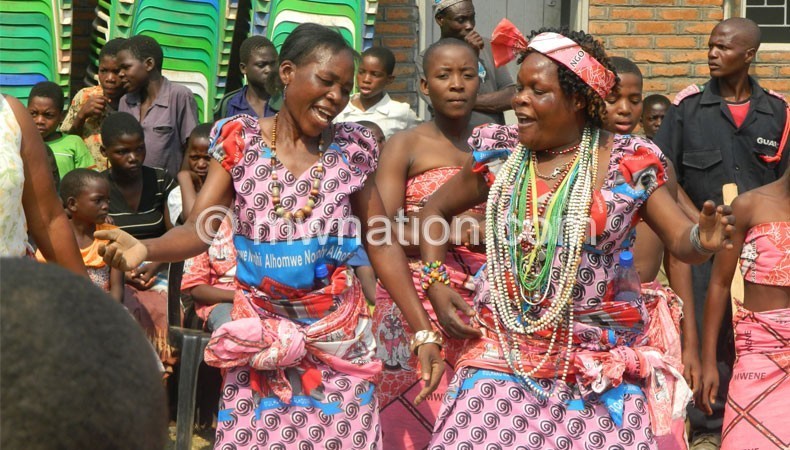Inside Malawi’s festivals
What’s in a music festival? That could be a confusing question in the music industry right now.
More and more music festivals are emerging on the music scene. The latest addition is the Pamchenga Gospel Music Festival to be launched early December this year.

The maiden festival gives a new dimension to festivals in Malawi by hosting an exclusive gospel music event along the waters of Lake Malawi in Salima.
This adds to the already long list of festivals. Some of these include the internationally renowned Lake of Stars Festival, Sand Music Festival, Likoma Festival, Tumaini Festival and Blantyre Arts Festival.
Recently, there has also been Sound and Light Festival, Nkopola Summer Splash and Chikale Easter Beach Festival that are celebrated in a day.

Apart from the music festivals, the country also has cultural festivals purely aimed at preserving and promoting cultural heritages.
These include Mulhakho wa Alhomwe, Tumbuka’s Gonapamuhanya, Ngoni’s Umthetho and the Malipenga Dance Season celebrated by natives in Northern Region districts of Karonga, Rumphi and Nkhata Bay; among others.
In the past, there used to be a clash of such events that sparked fears that the increase of festivals could lead to chaos in the music industry as organisers were scrambling for the same prime dates, especially during summer.
Although government intervened by harmonising such festivals, questions linger on if the country needs such a long list of festivals.
Chief tourism officer in the Department of Tourism Noah Nansongole says the country needs more festivals because these play an important part in domestic tourism of the country.
He says when people visit a particular area for a festival, they also get to appreciate the area’s physical attractions and learn about its social and cultural aspects which he says are major aspects of tourism.
“The festivals also help in the preservation of culture as various cultural aspects are promoted and showcased during the event.
“So, festivals are not important to tourists only. Even those who stay in urban areas are able to appreciate cultural aspects in rural areas where these festivals take place,” says Nansongole.
The recent festival that took place in Malawi is the Tumaini which was celebrated a fortnight ago at the Dzaleka Refugee Camp in Dowa.
According to the festival’s founder Trésor Nzengu Mpauni, the event attracted 7 000 patrons, 46 acts, five performance spaces, six nationalities of performers and three million people were reached by the media.
Mpauni, commonly known as Menes la Plume in the arts sector, says such a huge response, despite Malawi having several festivals, shows that the demand for such events is still high in the country.
“Malawi is a big country with a lot of artists who still need exposure through such events,” he says.
He, however, says Tumaini—a word which means hope—is more than a festival.
“It’s a festival with a cause,” he says, adding: “It is not just a festival where people go to have fun. It is a festival to promote peaceful co-existence between refugees’ community and Malawian community. We sing and dance together for peace. So, it’s different from all the festivals in Malawi.”
He says the festival also wants to promote values and talent of refugees as well as raise awareness that refugees are humans like anybody else.
“It also brings the talent of Malawians and the rest of Africa to the refugee camp so that the refugees can forget their pain and reduce the trauma.
“We also want to show the positive image of refugees to Malawians and to the world,” he says.
Other festivals like Lake of Stars are said to put Malawi on the world map as various international media outlets cover the event.
In addition, the Lake of Stars and Sand Festival are also attended by international patrons which Minister of Culture Patricia Kaliati says markets Malawi’s scenic beauty to the world.
Lake of Stars founder Will Jameson estimates that about 60 percent of this year’s 2 500 patrons at the festival were Malawian, with the remaining percentage coming from surrounding countries and Europe.
It is estimated that the festival generates $1.6 million for the Malawian economy. However, he told The Guardian recently that with the country’s economic crisis, he might consider holding the event in Europe.
He says the challenges have increased in the 12 years since he started the event.
“I think it’s got harder,” he is quoted by The Guardian of October 7 2016. “Malawi’s economy is in a bad way. We haven’t increased our ticket prices. It’s K32 000 for three days – if we’d followed the devaluation it should be about K48 000. Times are tough, but we’re still very passionate.”
Jameson says he is now looking into flipping the model and bringing artists to Europe.
“We’re considering doing Lake of Stars in London and either Glasgow or Edinburgh and reversing it by trying to get Malawian artists over to the UK,” he says. “I think the profile of the event is there. It’s big enough that it carries some weight.”
For other festivals like Likoma which are still on the learning curve, it is all about innovation by incorporating aspects that are missing in others, says Godfrey Kachimanga whose festival boasts of a ship cruise on the waters of Lake Malawi.





